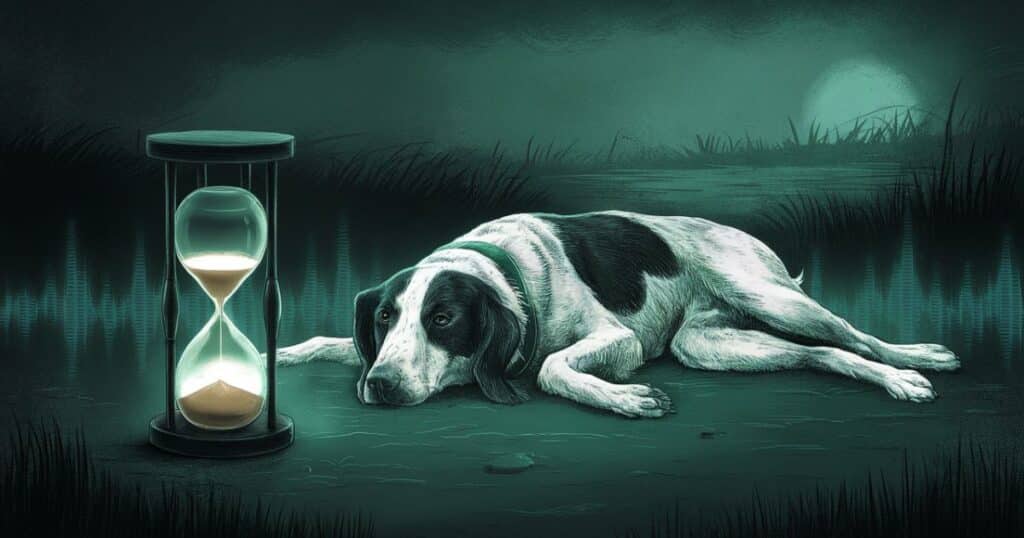As pet owners, we form deep bonds with our furry friends. It’s no wonder that when faced with the loss of a beloved dog, we might find ourselves pondering some unusual questions. One such query that sometimes crops up is: “Can dogs hear after they die?” While it might seem odd at first glance, this question actually touches on some fascinating aspects of canine biology, the dying process, and how we cope with pet loss.
Let’s dive into this topic with compassion and scientific accuracy, exploring what really happens to a dog’s hearing when they pass away.
Understanding Canine Hearing
Before we tackle the main question, it’s crucial to understand how a dog’s hearing works when they’re alive. This will help us better grasp what changes occur during the dying process and after death.
How Dogs’ Ears Work
Dogs have an impressive auditory system that puts our human ears to shame. Their ear structure is similar to ours but with some key differences:
- Outer ear: Dogs have movable ear flaps (pinna) that help funnel sound into the ear canal.
- Middle ear: Contains small bones that amplify sound vibrations.
- Inner ear: Houses the cochlea, which converts sound waves into nerve signals.
READ MORE: My Dog’s Stomach Gurgles And Won’t Eat: What’s Up With Their Appetite?
The Incredible Hearing Abilities of Dogs
Canine auditory perception is truly remarkable. Here are some fascinating facts about dog hearing:
- Dogs can hear frequencies up to 45,000 Hz, while humans top out at about 20,000 Hz.
- They can detect sounds four times farther away than humans can.
- A dog’s ears have 18 muscles, allowing for precise directional hearing.
These incredible sound perception abilities serve dogs well in their daily lives, from hearing approaching danger to responding to their owner’s voice from a distance.
What Actually Happens When a Dog Dies?

Now that we understand how powerful a dog’s hearing is during life, let’s explore what occurs during the dying process and immediately after death.
The Process of Death in Dogs
Death is a natural part of the life cycle, but understanding it can help ease our minds. When a dog dies, their body goes through a series of changes:
- Breathing stops
- Heart ceases beating
- Blood flow ends
- Brain activity ceases
- Body temperature drops
- Muscles relax
It’s important to note that once brain activity stops, all sensory perception, including hearing, comes to an end. The deceased pet’s senses no longer function as they did in life.
Why Some People Think Dogs Can Hear After Death
Despite the cessation of brain activity, some pet owners report observing reactions in their deceased animal that seem like responses to sound. These observations often lead to the misconception that post-mortem hearing is possible. However, these reactions are typically due to:
- Involuntary actions caused by residual nerve activity
- Muscle spasms that can occur as the body relaxes
- Release of trapped gases, causing movement or sounds
These death-related reactions are normal parts of the biological processes that occur after death but don’t indicate any ongoing sensory perception.
Debunking the Myth of Post-Death Hearing
Now, let’s address the central question: Can dogs hear after they die? The short answer is no, but understanding why can help us process our grief and appreciate the complexities of life and death.
Scientific Perspective on Sensory Function After Death
From a scientific standpoint, auditory function ceases when the brain stops working. Here’s why:
- Hearing requires a functioning brain to interpret sound waves.
- Without blood flow, the inner ear can’t convert sound to nerve signals.
- The auditory cortex in the brain, responsible for processing sound, shuts down.
Research on human brain activity at the time of death supports this understanding. While some brain activity may continue briefly after the heart stops, it doesn’t equate to consciousness or sensory perception.
The Difference Between Reflex and Conscious Response
It’s crucial to distinguish between reflexes and conscious responses. After death, a dog’s body might exhibit some post-mortem movements or reactions, but these are not conscious responses to stimuli. For example:
- Muscle twitches due to chemical changes in the body
- Release of air from the lungs, causing sounds
- Relaxation of sphincter muscles, leading to elimination
These bodily reactions can be startling or confusing for pet owners but are normal parts of the decomposition process.
Coping with the Loss of a Canine Companion
Understanding the physical realities of death is one thing, but dealing with the emotional impact is another. Let’s explore how to navigate the grieving process and honor our departed furry friends.
Understanding the Grieving Process
Losing a pet can be as painful as losing a human family member. The grieving process for pet guardians often includes:
- Denial
- Anger
- Bargaining
- Depression
- Acceptance
“Grief is the price we pay for love.” – Queen Elizabeth II
This quote reminds us that our sorrow is a testament to the deep bonds we form with our pets.
Honoring Your Dog’s Memory
There are many meaningful ways to memorialize a deceased pet:
- Create a photo album or scrapbook
- Plant a tree or flower in their memory
- Donate to an animal charity in their name
- Commission a portrait or piece of art
- Create a memory box with their favorite toys and collar
Remember, there’s no right or wrong way to grieve or memorialize your pet. Choose what feels most comforting to you.
Focusing on Quality of Life
While it’s natural to wonder about what happens after death, it’s even more important to focus on providing the best possible life for our dogs while they’re with us.
Making the Most of Your Dog’s Hearing While They’re Alive
Here are some ways to enrich your dog’s auditory experience:
- Play calming music when you’re away
- Use positive verbal reinforcement during training
- Introduce new sounds gradually to prevent fear
- Protect their ears from loud noises
- Engage in games that utilize their hearing, like hide-and-seek
When to Consult a Vet About Your Dog’s Hearing

Be aware of signs that might indicate hearing issues in your dog:
- Unresponsiveness to verbal commands
- Startling easily
- Excessive barking
- Tilting head frequently
- Ear infections or discharge
Regular vet check-ups can help catch and address hearing problems early, ensuring your dog maintains good auditory sensitivity throughout their life.
Conclusion
While it’s a common question, the reality is that dogs cannot hear after they die. Their auditory function ceases along with other bodily processes when they pass away. However, this doesn’t diminish the incredible bond we share with our canine companions or the impact they have on our lives.
Instead of focusing on post-mortem hearing or other aspects of the afterlife, we can honor our pets by cherishing the memories we’ve made, providing the best care possible while they’re alive, and finding healthy ways to cope with our grief when they pass.
ALSO READ THIS POST: My Dog Shakes, Acts Weird, Won’t Eat: What’s Up?
FAQs
Can dogs hear anything after they’ve passed away?
No, once a dog has died, all sensory functions, including hearing, cease as brain activity stops.
Why might a dog’s body twitch or move after death?
Post-mortem movements can occur due to residual nerve activity, muscle relaxation, or the release of trapped gases. These are normal bodily reactions and don’t indicate ongoing consciousness.
How long does it take for a dog’s senses to shut down when they die?
Sensory shutdown occurs rapidly as brain activity ceases, typically within minutes of the heart stopping.
Is there any truth to the idea that dogs have a “sixth sense” about death?
While dogs can often sense changes in their environment or their owner’s emotions, there’s no scientific evidence of a “sixth sense” about death. Their keen observation skills and sensitivity to human emotions might make it seem like they have a special awareness.
How can I tell if my dog’s hearing is declining as they age?
Signs of hearing loss in dogs include unresponsiveness to commands, startling easily, excessive barking, and difficulty waking from sleep. If you notice these signs, consult your veterinarian for a proper assessment.

Davin Connor is an experienced author with 3 years in pets writing. Known for concise, informative content, he shares expertise on pet care, behavior, and health through his engaging articles.






